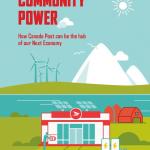Delivering Community Power

How Canada Post Can be the Hub of Our Next Economy
"We face too many crises in this country to address them one at a time. What's powerful about Delivering Community Power is how it takes on economic, environmental and social issues at the same time. Our post offices can become centres of community care and economic development, while bringing emissions down--this is the kind of leap we need in Canada."
Naomi Klein
Many think of Canada Post as a place to mail a care package, buy stamps or pick up the latest commemorative coin.
Some consider the post office past its prime: the last decade has seen efforts to cut, devalue and undermine this quintessentially public service. These moves have been fiercely resisted by people across the country.
What if our cherished national institution, with its vast physical infrastructure and millions of daily human interactions, could offer us something completely different? What if the post office could play a central role in building our next economy--an economy that is more stable, more equal, and less polluting?
We're thinking big. Will you join us?
Just ImagIne...
* Charging stations for electric vehicles at post offices
* A renewable-powered postal fleet that connects farms to dinner tables
* Door-to-door mail carriers checking in on seniors and people with mobility issues as well as delivering locally- produced food and other services
* Post offices as community hubs for social innovation, connecting climate-friendly businesses to customers
* Postal banking services that provide small towns and Indigenous communities with inclusive financial services - like loans to families underserved by commercial banks
* Public-interest financial services that fuel the green energy transition in urban, rural and Indigenous communities We want a 100% renewable economy that addresses inequality, puts power in our hands and improves our lives.
Our post office can deliver it.
Meet Your New Local Post Office
Mary is going to her post office in Tatamagouche, nova Scotia, to mail a letter. Things have really changed over the past year.
Outside, there's an electric car plugged into the post office's rapid charging station. next to it, a mail carrier is loading produce from a local farm into a new Canada Post delivery van -- a plug-in hybrid model made in Canada. On the post office's roof are solar panels, and a wall display tracks how much power they're generating.
Stepping inside, Mary sees a poster advertising loans for solar panels and energy-saving home retrofits. as the clerk takes her letter at the counter, he explains that the post office is once again offering banking services. With a small loan, tax credits and other incentives, any household, farm or business can become a renewable power generator. The system will pay for itself over time.
A week later, Mary heads back to the post office to sign up for solar panels. On the way, she passes a payday lending operation that used to charge exorbitant fees but that has recently gone out of business. This time, she's greeted by a postal worker in a green windbreaker, who's just returned from a regional training program. She tells Mary about a proposed community-owned wind energy project (there's already one in the territory of a nearby First nation), and that the postal bank is ready to finance its expansion if more local investors come forward -- she's already sent letters to everyone who lives within 20 km.
At the counter, Mary hands in her loan application. as soon as it's approved, the post office will help her coordinate with the solar installer. On her way out, she sees the new Canada Post van setting off on a round of elder visits, with prescription medications and farm-to-table groceries on board.
